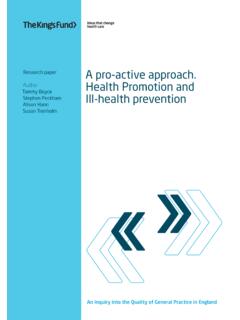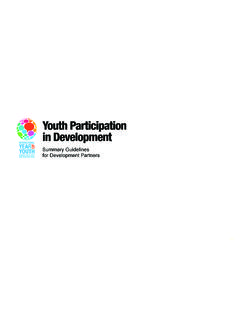Transcription of Te Tiriti o Waitangi-based practice in health promotion
1 Te Tiriti o Waitangi-based practice in health promotion Grant Berghan, Heather Came, Nicole Coupe Claire Doole, Jonathan Fay, Tim McCreanor and Trevor Simpson ACKNOWLEDGEMENTS. Thank you to the senior practitioners and to STIR: Stop Institutional Racism, for your contributions to this work, and to Emma Rawson additionally for her data collection. Thanks to the Faculty of health & Environmental Scienc- es, Auckland University of Technology (AUT) and to the Auckland branch of the Public health Association for financially supporting this project, and to the School of Public health and Psychosocial Studies at AUT for part funding the costs of the print version of this resource.
2 Thanks to Dominic O'Sullivan, Amy Zander, Rose Black, Maria Humphries, Susan da Silva and Maria Rameka for DEDICATION your comments and feedback on drafts of sections of To Dr Irihapeti Ramsden this resource, to Keith Tudor, the grammar king, and to for her staunch Susan Healy, Fiona Cram and Moana Jackson for their championship of the academic peer review. relationship between Thanks to Jenny Rankine, of Words & Pictures for editing, te Tiriti o Waitangi and health . design and layout. The legacy of your work Cover photo of a Matamata landscape by Tobias Keller continues on in nursing from Unsplash.
3 And beyond. CITATION. Berghan, G., Came, H., Coupe, N., Doole, C., Fay, J., McCreanor, T., & Simpson, T. (2017). Te Tiriti o Waitangi-based practice in health promotion . Auckland, Aotearoa New Zealand: STIR: Stop Institutional Racism. Accessed from: ty- Waitangi-based - practice - health -promot ion [Note: This electronic version has different pagination from print copies.]. Te Tiriti o W itangi-based practice in health promotion Grant Berghan, Heather Came, Nicole Coupe Claire Doole, Jonathan Fay, Tim McCreanor and Trevor Simpson Published by STIR: Stop Institutional Racism Auckland, Aotearoa/New Zealand 2017.
4 ISBN 978-0-473-41439-9. CONTENTS. Glossary 5. Foreword 6. Introduction 8. health promotion and te Tiriti o Waitangi 9. Method 12. Te Tiriti o Waitangi 15. He Kupu Whakatahi Preamble to te Tiriti o Waitangi 18. Working with the Preamble 19. a) Whanaungatanga 19. Ko te Tuatahi Article One: K wanatanga 21. Working with Article One 23. a) Decision-making 23. b) M ori representation and kaitiakitanga 24. c) Structural mechanisms 25. Ko te Tuarua Article Two: Tino rangatiratanga 26. Working with Article Two 28. a) M ori providers 28. b) M ori health promotion 29.
5 C) Anti-racism praxis 30. Ko te Tuatoru Article Three: ritetanga 31. Working with Article Three 33. a) Normalising ethical practice 33. b) Equity-centric evaluation 34. c) Determinants of health 35. Ko te Tuawha Article Four: Wairuatanga 37. Working with Article Four 38. a) Normalising wairuatanga 38. b) Te Reo me na tikanga 40. c) Tapu and noa 41. Pathways Forward: Taking action 42. Taking action being an ally 42. Decolonisation and power-sharing 44. Concluding thoughts 45. Appendix 1 Interview questions 46. Appendix 2 47. The senior practitioners 47. The reviewers 50.
6 The authors 50. References 53. 4 Te Tiriti o Waitangi in health promotion 2017. GLOSSARY. Aroha ki te tangata expression of love to P keh New Zealanders of European descent other people Pou pillar Hap sub-tribe P whiri welcome on marae He kanohi kitea a face seen R hui restrictions Hinengaro emotional and mental wellbeing Rangatahi youth Hui large gathering Rangatira chief Iwi tribe Rite the same or alike Kai food Taiao the natural environment Kaimahi worker Taonga treasures Kaitiaki guardian Tapu sacred or prohibited Kai rahi guide Tauiwi non-Maori Kawa whakaruruhau cultural safety Tautoko support Karakia prayer Te ao M ori the M ori world
7 Kaupapa M ori M ori approach T n koutou formal greeting to a group K wana governance Te Puni K kiri Ministry of M ori development K wantanga governance Te Tiriti o Waitangi M ori text of the Treaty of Koha reciprocity Waitangi Komiti committee Tikanga M ori system of customs and traditions K rero conversation Tinana Physical body Kuia/kaum tua elders Tino rangatiratanga sovereignty Mana prestige and authority Te reo M ori M ori language Man ki nurture Wairua/Wairuatanga spiritual strength and Mana whenua territorial land right holders practice Marae courtyard meeting place Whakapapa genealogy or lineage M t waka M ori living outside their tribal areas Whakatau welcome M tauranga M ori traditional M ori knowledge Wh nau extended family Mauri life force Whanaungatanga active relationship building Noa something safe or normal Whenua land ritetanga equity 2017 Te Tiriti o Waitangi in health promotion 5.
8 FOREWORD. I. t is appropriate this resource The resource's emphasis on emphasis on the English is dedicated to Irihapeti the M ori words in te Tiriti is Version of the Treaty, which Ramsden. As a nurse and especially important too as it ignores the linguistic and deep-thinking philosopher, recognises the often-ignored cultural facts of M ori life in she was committed to finding reality that all of the iwi and 1840 in favour of privileging practical ways to give effect to hap discussions about the an alleged cession of M ori te Tiriti o Waitangi, especially Treaty in 1840 were in te reo sovereignty to the Crown.
9 It in health . Her promotion of M ori. Of course, that is not therefore also reaffirms the iwi the concept of cultural safety surprising as it was the language and hap reality that no ran- in nursing recognised the of this land at that time and gatira had the right or authority power dynamics at play in any an important exercise of mana to cede or give away the sov- relationship between health or rangatiratanga such that ereignty or mana which they professionals and those in their treating between polities would were entrusted with exercising. care. In a very real sense it was naturally be conducted in M ori.
10 Even to contemplate doing that based in te Tiriti o Waitangi and It is equally unsurprising that would have been spiritually and was thus a recognition that the the rangatira signed the words culturally incomprehensible, as Tiriti Treaty relationship is alsoof te Tiriti only in te reo M ori, well as legally impossible. about power. apart from the few rangatira The resource is particularly This resource builds upon that at Waikato Heads who were timely too as it reflects the recognition and in a carefully shown only the English text. In evolving understanding of te considered and practical way it that regard M ori have long said Tiriti that has occurred since offers guidance for all who work that the rangatira did not sign the 1970s when the so-called in the health sector to manage the English words because they radical M ori groups such as and develop their Treaty based were neither discussed nor read Ng Tamatoa took it off the practice in ways that recognise and thus were irrelevant.


